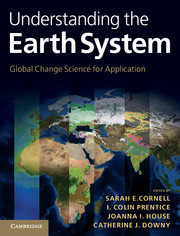Book contents
- Frontmatter
- Contents
- Editors
- Scientific editorial team members
- Contributing authors
- Foreword
- Preface
- Acknowledgements
- Units
- 1 Earth system science and society
- 2 Fundamentals of climate change science
- 3 How has climate responded to natural perturbations?
- 4 The Earth system feedbacks that matter for contemporary climate
- 5 Earth system models
- 6 Climate change impacts and adaptation
- 7 The role of the land biosphere in climate change mitigation
- 8 Society’s responses and knowledge gaps
- Acronyms
- Glossary of terms
- Index
- References
8 - Society’s responses and knowledge gaps
Published online by Cambridge University Press: 05 November 2012
- Frontmatter
- Contents
- Editors
- Scientific editorial team members
- Contributing authors
- Foreword
- Preface
- Acknowledgements
- Units
- 1 Earth system science and society
- 2 Fundamentals of climate change science
- 3 How has climate responded to natural perturbations?
- 4 The Earth system feedbacks that matter for contemporary climate
- 5 Earth system models
- 6 Climate change impacts and adaptation
- 7 The role of the land biosphere in climate change mitigation
- 8 Society’s responses and knowledge gaps
- Acronyms
- Glossary of terms
- Index
- References
Summary
Society’s needs for the knowledge that Earth system science can provide are urgent, but the challenges of knowledge integration and application are substantial. This closing chapter explores some of the issues that arise with the move towards an increasingly ‘applied’ Earth system science.
Introduction
At the start of this book, we traced the development of Earth system science from its early foundations, including its evolving interfaces with other academic disciplines and policy. Here we take an exploratory forward look, with a particular focus on some of the more contentious issues that currently surround climate science. We draw attention to unaddressed knowledge gaps and unstated conceptual problems, which we believe are making it harder than it need be to establish an effective communication and accommodation between policy-making and science. We argue that it is important to recognize what science can and cannot achieve, and what scholarship could achieve in the service of good policy-making, if the right questions were addressed and methodologies developed.
Nothing we say should be interpreted as diminishing the value of Earth system science as a fundamental investigation of the interacting biological and physical/chemical processes that have sustained life on Earth. However, much of the funding that has supported the rapid advances in this field of research during the past two decades has been made available by governments with a more focused agenda, keen to assess the likely magnitude and consequences of anthropogenic climate change and (increasingly) the options for mitigation of, and necessities for adaptation to, climate change on a policy-relevant timescale. Like it or not, scientists have thereby become embroiled in debates and controversies for which they were not well prepared.
Information
- Type
- Chapter
- Information
- Understanding the Earth SystemGlobal Change Science for Application, pp. 245 - 256Publisher: Cambridge University PressPrint publication year: 2012
